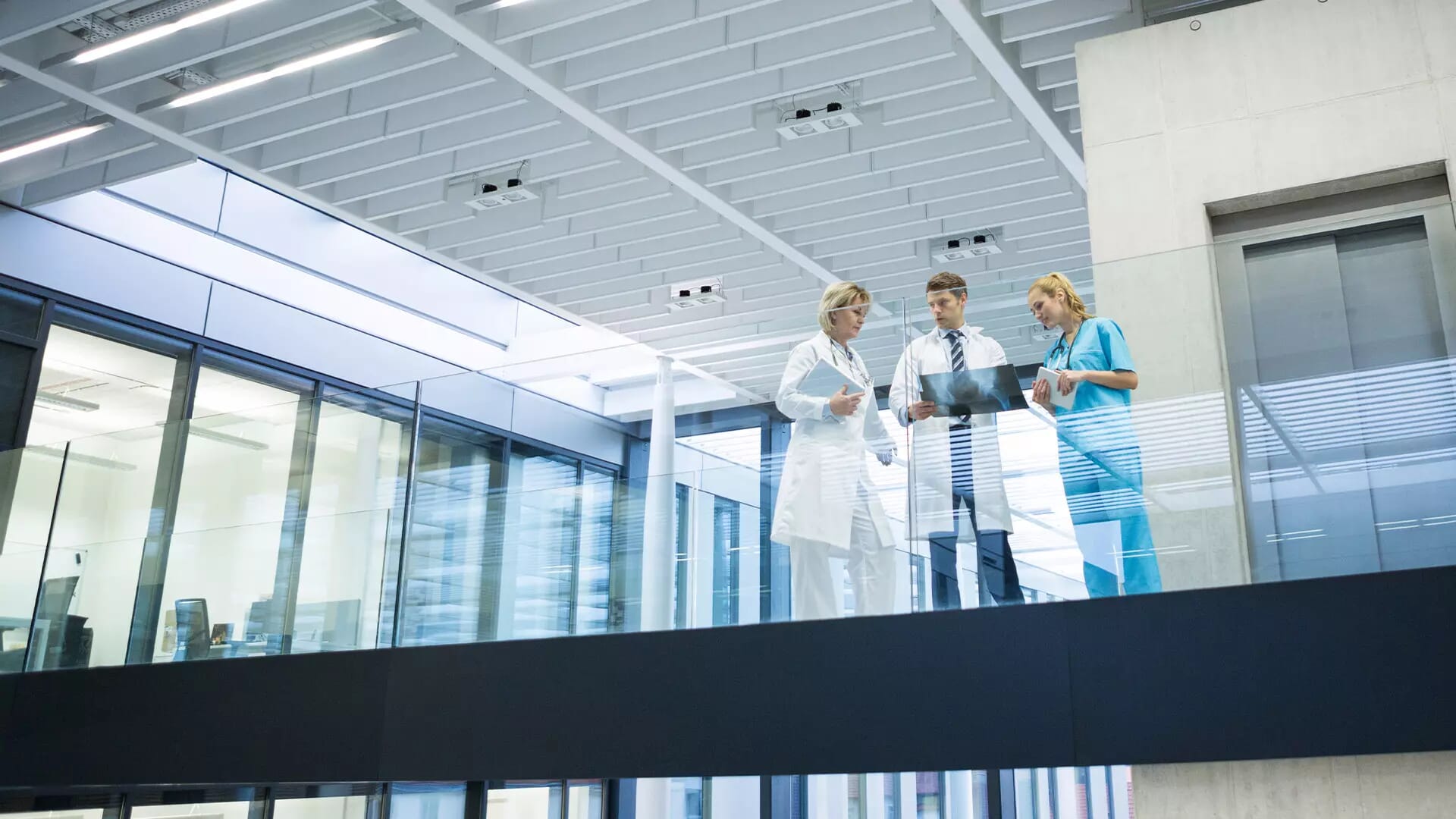 Credit: Wavebreakmedia | envato
Credit: Wavebreakmedia | envatoProspects and peculiarities within healthcare real estate
Carrie Hiebeler, Founder and Managing Partner of Greene Park Capital, in an exclusive interview with GRI Club
May 23, 2024Real Estate
Written by Helen Richards
The Covid-19 pandemic thrust the healthcare industry into the spotlight, sparking a global boom that continues to this day. Simultaneously, the industry is rapidly evolving, with technology, data, consumerism, and ESG all significantly disrupting the traditional status quo.
Radical changes far beyond the predictable telemedicine are forecast, including a more tailored healthcare experience, and Artificial Intelligence (AI) and Machine Learning (ML) integration, to name a few.
Amid these captivating developments unfolding within the healthcare sector, Carrie Hiebeler, Founder and Managing Partner of Greene Park Capital, sat down with GRI Club to share the opportunities and specific characteristics of healthcare real estate.
Greene Park Capital, a healthcare real estate investment and asset management firm, was founded in 2020 “while the world was upside down,” shared Carrie. This uniquely all women-owned firm currently operates in both the US and Europe, where Carrie described some key market differences.
How would you compare the US and European healthcare market?
“The ageing demographic is similar and sickness and care is universal, but the systems are different, and the countries and cultures are different.
The US is more robust in terms of asset classes versus the UK. For example, the US has a massive rehabilitation asset class within healthcare, and the UK does not, which is something we're looking to build in the UK, and possibly Europe. Senior living is also more robust in the US, but it is certainly growing in the UK and Europe, and the demand is certainly there.
In the UK, we focus on private pay healthcare, but we believe there's a great opportunity for private capital to work with the NHS (National Health Service) and other public healthcare domains, and we're seeing more interest from the public sector to work with private capital.”
Why do you view healthcare in the UK and Europe a sector worth investing in?
“The economic turbulence in the past few years has brought a great opportunity. We work with big capital institutions that don't have a lot of exposure to healthcare and want some.
Right now is a great opportunity to buy healthcare real estate because, while it doesn't grow as fast as in other sectors like data centres, it has stabilised cash flows. With rates where they are, it’s a really good place to invest.
It obviously also has a strong ESG component and is an important part of society. We have to take care of people, and where we take care of them and how we take care of them is important.”

What are you most concerned about for the healthcare real estate market?
“I worry about the state of the buildings and the lack of capital expenditures that have been put into existing healthcare infrastructure in the UK and Europe at large.
When you buy real estate right now, you're not just buying the real estate, but you have to really figure out how that real estate is going to work for the consumer, and if it is up to par. People aren't putting enough money into the bricks and mortar of the building and they're overburdening the operator.
When we look at our investments, we're not just looking at the existing investment today, but what does the investment look like in the future and what are those capital expenditures required to make that investment meet the demands of the consumer or the patient?”
Do you see the health care sector changing in the coming decades?
“I definitely do. Telemedicine is real. People will obviously utilise these buildings for diagnostics and imaging, surgical procedures, rehabilitation - things that they can't get from a computer - but GP and many behavioural health visits can be done on a screen, and that's totally appropriate.
Technology is going to help healthcare a lot in terms of efficiency, but it's also going to make some of these buildings obsolete, so as healthcare investors, we have to make sure that we are investing in buildings that are ready for that future.
The buildings will change, they will be more clinical than they were in the past. These buildings are ready for procedures, such as infusion therapy. That's how the building should work for the consumer.
I think we'll also start to see a lot of tailored drugs, and life sciences will merge with hospitals in tailoring drugs for the specific patient and illness. The world of commercial manufacturing, labs, life sciences, and delivery of care will merge, but it will take a while.
At Greene Park Capital, we're starting to look at labs, life sciences, and contract manufacturing. We saw in the pandemic that a lot of people are now wanting to manufacture on their home turf, and we see that is going to happen with drugs as well. So the next area for our growth would most likely be in drug manufacturing labs, and life sciences.”
Stay tuned on the GRI Hub for exclusive interviews with leading real estate market players from across the globe.
The Covid-19 pandemic thrust the healthcare industry into the spotlight, sparking a global boom that continues to this day. Simultaneously, the industry is rapidly evolving, with technology, data, consumerism, and ESG all significantly disrupting the traditional status quo.
Radical changes far beyond the predictable telemedicine are forecast, including a more tailored healthcare experience, and Artificial Intelligence (AI) and Machine Learning (ML) integration, to name a few.
Amid these captivating developments unfolding within the healthcare sector, Carrie Hiebeler, Founder and Managing Partner of Greene Park Capital, sat down with GRI Club to share the opportunities and specific characteristics of healthcare real estate.
Greene Park Capital, a healthcare real estate investment and asset management firm, was founded in 2020 “while the world was upside down,” shared Carrie. This uniquely all women-owned firm currently operates in both the US and Europe, where Carrie described some key market differences.
How would you compare the US and European healthcare market?
“The ageing demographic is similar and sickness and care is universal, but the systems are different, and the countries and cultures are different.
The US is more robust in terms of asset classes versus the UK. For example, the US has a massive rehabilitation asset class within healthcare, and the UK does not, which is something we're looking to build in the UK, and possibly Europe. Senior living is also more robust in the US, but it is certainly growing in the UK and Europe, and the demand is certainly there.
In the UK, we focus on private pay healthcare, but we believe there's a great opportunity for private capital to work with the NHS (National Health Service) and other public healthcare domains, and we're seeing more interest from the public sector to work with private capital.”
Why do you view healthcare in the UK and Europe a sector worth investing in?
“The economic turbulence in the past few years has brought a great opportunity. We work with big capital institutions that don't have a lot of exposure to healthcare and want some.
Right now is a great opportunity to buy healthcare real estate because, while it doesn't grow as fast as in other sectors like data centres, it has stabilised cash flows. With rates where they are, it’s a really good place to invest.
It obviously also has a strong ESG component and is an important part of society. We have to take care of people, and where we take care of them and how we take care of them is important.”

Healthcare buildings will change as they adapt to the evolving industry and the growing presence of telemedicine. (Credit: halfpoint | envato)
What are you most concerned about for the healthcare real estate market?
“I worry about the state of the buildings and the lack of capital expenditures that have been put into existing healthcare infrastructure in the UK and Europe at large.
When you buy real estate right now, you're not just buying the real estate, but you have to really figure out how that real estate is going to work for the consumer, and if it is up to par. People aren't putting enough money into the bricks and mortar of the building and they're overburdening the operator.
When we look at our investments, we're not just looking at the existing investment today, but what does the investment look like in the future and what are those capital expenditures required to make that investment meet the demands of the consumer or the patient?”
Do you see the health care sector changing in the coming decades?
“I definitely do. Telemedicine is real. People will obviously utilise these buildings for diagnostics and imaging, surgical procedures, rehabilitation - things that they can't get from a computer - but GP and many behavioural health visits can be done on a screen, and that's totally appropriate.
Technology is going to help healthcare a lot in terms of efficiency, but it's also going to make some of these buildings obsolete, so as healthcare investors, we have to make sure that we are investing in buildings that are ready for that future.
The buildings will change, they will be more clinical than they were in the past. These buildings are ready for procedures, such as infusion therapy. That's how the building should work for the consumer.
I think we'll also start to see a lot of tailored drugs, and life sciences will merge with hospitals in tailoring drugs for the specific patient and illness. The world of commercial manufacturing, labs, life sciences, and delivery of care will merge, but it will take a while.
At Greene Park Capital, we're starting to look at labs, life sciences, and contract manufacturing. We saw in the pandemic that a lot of people are now wanting to manufacture on their home turf, and we see that is going to happen with drugs as well. So the next area for our growth would most likely be in drug manufacturing labs, and life sciences.”
Stay tuned on the GRI Hub for exclusive interviews with leading real estate market players from across the globe.